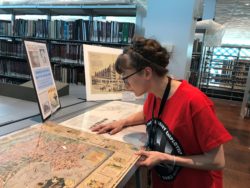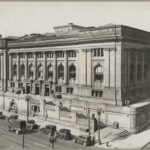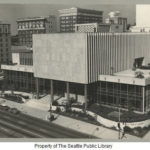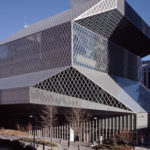 Growing up in rural Kitsap County, the daughter and granddaughter of librarians, becoming a librarian was the furthest thing from Anne Cisney’s mind. However, life has a funny way of working out. Once she entered the workforce, she realized that her favorite tasks in every job were things librarians get to do all the time – research, teaching and empowering people – so she eventually went back to college to get her library degree. She is now a fixture at the Seattle Central Library, just like her father and grandmother before her!
Growing up in rural Kitsap County, the daughter and granddaughter of librarians, becoming a librarian was the furthest thing from Anne Cisney’s mind. However, life has a funny way of working out. Once she entered the workforce, she realized that her favorite tasks in every job were things librarians get to do all the time – research, teaching and empowering people – so she eventually went back to college to get her library degree. She is now a fixture at the Seattle Central Library, just like her father and grandmother before her!
What is your family connection to the Library?
My grandmother, Dagny, graduated from UW Library School in 1926 and worked at the original Central Library Carnegie building, in the circulation department, until my dad was born in 1939 (his birth announcement was in the staff newsletter). She went on to be a school librarian in Kitsap County and then a branch librarian with Kitsap Regional Library, where my mother also later worked.
My dad, Eric, began as a teacher but went back for his MLIS (Master of Library and Information Science), graduating with my mother from the UW Library School in 1966. He worked at SPL from that year until 2005 as a technology librarian whose specialties included the automotive repair collection. His tenure spanned two Central Library buildings and some tremendous shifts in how we do our work.
I graduated from the UW iSchool in 2006, entering SPL first at the Washington Talking Book and Braille Library, then becoming a branch Librarian (Ballard, Magnolia, and Greenwood,) and finally moving to the Central Library’s then Magazine and Newspaper department in around 2010. Now, my desk is in the Business, Science and Technology floor, one cubical away from my dad’s former seat.
It was a complete coincidence that we all graduated from the same library school at 40 year intervals. We didn’t even realize it until my graduation day.
What do you think is the Library’s role in the community?
I believe the Library exists to provide free and fair access to information and entertainment, opportunities for gathering and civic engagement and friendly assistance to individual patrons. It also plays a vital role in helping even the playing field within the community, offering educational opportunities to people who might not otherwise be able to afford these services.
Public libraries are among the last truly democratic spaces we have, existing for the use and benefit of everyone in the community – regardless of age, income, occupation, nationality, country of origin, education level, gender identity or expression, disability status or specific interests. Whether you’re starting a business, reading for pleasure, or looking for a safe place to sleep for the night, we are here to talk things through and help you reach the next step in your journey. You are valued. Your questions are important. Your experiences are unique.
How has the Library changed from generation to generation?
I believe the mission of the Library, and its essential work, has changed remarkably little between my grandmother’s day and my own. We have always helped people find information and solve problems.
One thing that has changed, beginning shortly after my father started at the Library, is how information can be accessed. Where previously the universe of knowledge lay in paper format in the Library, accessible via card catalog, the late 1960s saw the birth of many powerful new technologies. Complex professional databases were followed by friendlier databases for patron use, the internet, downloadable materials and wi-fi.
Until the late 1990s, the Library did a brisk and regular business mediating bar bets by phone and even helping with the occasional jeopardy question. We relied on almanacs and other fast fact sources to sate curiosity, while also assisting with deeper, more challenging research. In the modern Library, patrons solve many simple questions using search engines, but the number of deep, complex and sensitive questions is on the rise. Rather than difficulty finding any information, patrons are often overwhelmed with potential information sources. This leaves librarians in the role of navigator through the information universe. We help people know what information exists, how to find it and how to evaluate whether it is trustworthy.
Right now, the Library is currently doing really important, intentional work to ensure that the services we provide are truly reaching not just “everyone” but the most vulnerable among us. However, even this work is not new. Providing services to the immigrant and refugee communities, for example, was in important focus of the Library in the early 1980s as well, in the aftermath of the Vietnam war. We are diving deeper and using better tools and more sophisticated data now, and we have a lot farther we can go, but even this has always been a key part of our work.
How does the Library stay relevant?
The most important thing we can do is to listen to our patrons. That means both sharing the types of needs and experiences patrons express when they come to the Library and reaching out into the community to identify additional gaps that we could meet with resources and services, often for patrons who have not used the Library much in the past.
There is always far more need than we have capacity, forcing the Library to make difficult choices at every turn regarding where best to focus our limited resources. The Seattle Public Library Foundation and its donors make a huge difference in expanding the scope of what we are able to accomplish. We are so lucky to have you!
What do you think the Library will be like 25 years from now?
As technology evolves, our means for connecting with patrons will also evolve, but I strongly feel that the role of the Library in the community and the basic human needs that we meet will continue on much as they have been for the last hundred years. I hope that the Library of 2043 will be a diverse place, where the staff reflects the community closely and we have found ways to seamlessly bridge the language and cultural barriers that sometimes challenge us now. I hope that the Library continues to value both digital material and physical collections, and that The Seattle Public Library will be seen as a shining example of the role a public library can play in preserving and reflecting back the history of the community it serves.



